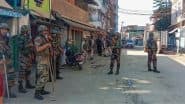Imphal, May 3 (PTI) From running a successful business to no income and three children to support, G Kipgen is waiting to return to his home in Imphal amidst a sense of despair. But he is not alone, there are many like him.
The devastating impact of the ethnic conflict that rocked Manipur two years ago is still being felt, with thousands of Internally Displaced Persons (IDPs) continuing to live in overcrowded camps — waiting and hoping to return to their homes amidst fragile peace.
"I used to run a successful coaching institute in Imphal. It's all gone now. With no source of income and three children, I am worried about their future. I can't focus on anything. What is even more concerning is that there is no sign of how things will get better," an emotional Kipgen said.
Over 260 people have been killed, 1,500 injured, and over 70,000 people displaced after the ethnic violence broke out between the Meitei and the Kuki-Zo people on May 3, 2023.
Despite the sacking of controversial Chief Minister N Biren Singh for "not being able to handle" the situation, and the imposition of President's rule in February this year, peace remains a far cry.
"My greatest worry is the future of my two little children," said Abung, a Meitei IDP from Churachandpur district who is staying in a prefabricated home in Bishnupur district.
"Earlier, I had a thriving grocery business. While living in a prefabricated home is better than staying in a relief camp, it doesn't compare to the freedom and happiness of living in one's own home," he added.
As the IDPs struggle to rebuild their lives from the trauma of displacement, civil society organisations on both sides continue to hold firm to their demands.
While hill-based Kukis call for a separate administration, the Meiteis, who are in the majority in Imphal valley, seek implementation of the National Register of Citizens (NRC), and the deportation of those they consider illegal immigrants.
Despite monitoring by central and state authorities to control violence and improve the lives of the affected, there is growing frustration among the general public.
The IDPs, whether Meitei or Kuki, have voiced deep insecurity about their families' future and are grappling with severe psychological distress.
Many remain unable to comprehend how they suddenly became victims of hate and anger.
The government and NGOs imparted skill training to IDPs to make them employable, but these initiatives have done little to ease their emotional burden.
Abenao Devi, living in a prefabricated home in Imphal, said, "In the first few months after the violence broke out, there was significant community support, and provisions arrived on time. But gradually, we've been forgotten. Often, we have to depend on the mercy of others for basic needs. It is humiliating."
The IDPs are doing odd jobs they never imagined doing before, she said adding both the central and state governments are unable to curb hostilities and restore normalcy even after two years.
A central security agency official claimed: "The most problematic and worrisome aspect of this two-year-long conflict is that armed groups and their associates have taken control of the respective communities. They are pushing their agenda ignoring the suffering of ordinary people, particularly the IDPs."
He added, "There has also been a massive rise in extortion by armed outfits in the Imphal valley and illegal taxation along highways passing through Kuki-majority areas. Several previously defunct militant outfits have been revitalised, recruiting mostly unemployed, poorly educated youth." PTI COR NN PYK
(This is an unedited and auto-generated story from Syndicated News feed, LatestLY Staff may not have modified or edited the content body)













 Quickly
Quickly














